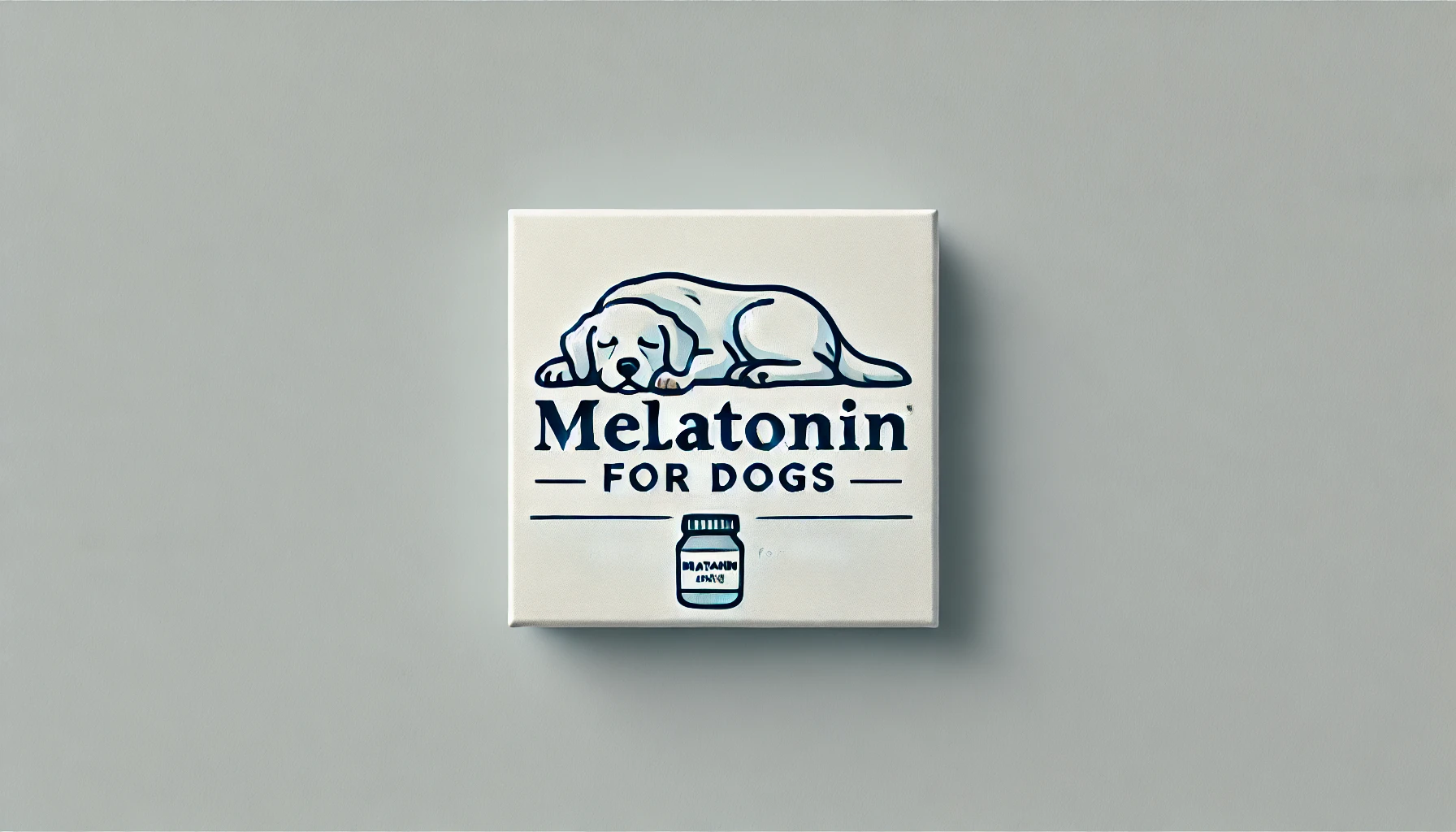7 Reasons to Use Melatonin for Dogs: Safe Solutions for Sleep & Anxiety

Have you found yourself up late, Googling, “Can dogs have melatonin?” Maybe your dog is restless, struggling with anxiety, or just can’t seem to settle. I’ve been there, with my dog Rocky pacing the house, his nervousness growing at every little sound. I had no idea how to help him until I came across the idea of melatonin for dogs. Curious, I dove into the research: is melatonin safe for dogs, and if so, how much melatonin can you give a dog? Today, I’ll walk you through everything I learned, so you can decide if melatonin is right for your pet.
Table of Contents
What Is Melatonin, and How Does It Work in Dogs?
Melatonin is a naturally occurring hormone produced by the pineal gland in both humans and animals, regulating the sleep-wake cycle. Dogs, like us, produce melatonin naturally, but stress, aging, or medical conditions can disrupt this balance. That’s where giving a dog melatonin might help, as it can supplement their natural levels and support more restful sleep and calm.
If you’re wondering, “Can you give melatonin to dogs?” the answer is yes, but there are important details to consider, especially regarding dosage and the type of melatonin you choose.
Why Consider Melatonin for Dogs?
Let’s take a look at some common reasons people choose melatonin for dogs and how it can help with various issues:
- Separation Anxiety: Canine melatonin can soothe anxious dogs when left alone, helping them feel secure even when you’re not there.
- Fear of Loud Noises: If your dog is terrified of thunderstorms or fireworks, melatonin for dogs might help reduce their panic.
- Sleep Issues: Melatonin is often used as a safe sleep aid for dogs, especially for aging dogs who struggle to rest through the night.
- Cushing’s Disease: Some veterinarians recommend melatonin as part of a management plan for dogs with Cushing’s disease.
- General Anxiety: For dogs with mild anxiety, melatonin can act as a natural, gentle relaxant without heavy sedative effects.
If any of these situations sound familiar, you might wonder, “Can I give my dog melatonin regularly?” Many pet owners find it safe to use melatonin as part of their dog’s wellness routine, but it’s best to consult with a vet to confirm what’s safe for your specific dog.

How Melatonin for Dogs Helps Ease Separation Anxiety
Separation anxiety is a common struggle, and melatonin can be a great help for dogs who get nervous when left alone. When I started giving melatonin to Rocky, I noticed he became more relaxed and no longer had to follow me from room to room every time I left. If you’re curious, “Can you give a dog melatonin every day?” the answer is yes, but be cautious and talk to your vet first, as every dog’s needs vary.
For Your information
Dealing with a cat peeing on the bed can be challenging, but understanding the causes and applying effective solutions can help resolve the issue. From medical evaluations to behavioral adjustments, each step in this process aims to address your cat’s needs while keeping your home clean and comfortable.
Melatonin as a Solution for Dogs Scared of Loud Noises
Does your dog hide during thunderstorms? Melatonin for dogs might help take the edge off. By giving melatonin about 30 minutes before an anticipated stressful event, such as fireworks, you may help your dog remain calmer.
Tip: While melatonin can ease temporary fears, it’s not a permanent fix for phobias. For severe anxiety, consider additional training or consult a vet about combining melatonin with other calming aids.
Dosage Guidelines for Melatonin in Dogs
The correct melatonin dosage for dogs depends on their weight. Here’s a quick guide:
| Dog’s Weight | Suggested Dosage |
|---|---|
| Up to 10 lbs | 1 mg |
| 10–25 lbs | 1.5 mg |
| 26–100 lbs | 3 mg |
| Over 100 lbs | 3–6 mg |
It’s normal to wonder, “How much melatonin can I give my dog safely?” These are general guidelines, but always check with your vet for an exact dose tailored to your dog. You might also ask, “Can I give my dog 10 mg of melatonin?” This dose would typically be too high for most dogs, and overdosing can have side effects.
Is Melatonin Safe for Dogs? What to Watch Out For
Many pet parents wonder, “Is melatonin toxic to dogs?” Generally, melatonin is safe for dogs when administered correctly, but there are a few things to keep in mind:
- Avoid Melatonin with Xylitol: Some melatonin products for humans contain xylitol, which is extremely toxic to dogs.
- Check for Allergies or Sensitivities: Although uncommon, some dogs may have mild side effects like drowsiness or stomach upset.
- Consult Your Vet for Long-Term Use: If you’re considering giving melatonin to your dog daily, confirm with your vet that it’s safe.
Quick Tip: For dogs, melatonin supplements without xylitol or other artificial additives are best. Consider canine-specific melatonin to avoid harmful ingredients.
Melatonin and Cushing’s Disease in Dogs
One lesser-known use of melatonin for dogs is to help manage symptoms of Cushing’s disease. Cushing’s disease causes an excess of cortisol, leading to various health issues. While melatonin isn’t a cure, some vets recommend it as a supplement to reduce cortisol production.
Important: If you’re wondering, “Can melatonin hurt dogs with specific health conditions?” always speak to your veterinarian to ensure it’s safe.
Melatonin for Senior Dogs with Sleep Issues
Aging can disrupt a dog’s sleep cycle, causing them to become restless at night. Melatonin for older dogs can offer a gentle way to support their sleep and overall well-being. You may wonder, “How much melatonin should I give my senior dog?” Follow the dosage chart above and monitor their response.
Pro Tip: Consistency matters. Give melatonin at the same time each evening to help regulate their routine.
Tips for Administering Melatonin to Dogs
If you’re considering giving a dog melatonin, here are some helpful tips:
- Use the Right Dose: Start with a lower dose and increase only if needed.
- Choose Dog-Safe Formulas: Use melatonin without xylitol or other harmful additives.
- Consistency Is Key: For the best results, give melatonin at the same time every day.
FAQs about Melatonin for Dogs
Q: Can dogs eat melatonin gummies?
A: Human melatonin gummies often contain xylitol, which is toxic to dogs, so it’s best to avoid gummies altogether.
Q: Can I give my dog human melatonin?
A: Human melatonin is safe in some cases, but look for dog-specific melatonin to avoid ingredients that might be harmful.
Q: Is melatonin safe for puppies?
A: Melatonin for puppies is generally safe but requires vet approval. Start with a very low dose if advised.
Q: What if my dog accidentally ate melatonin?
A: If a dog ate melatonin, monitor them for side effects like drowsiness. Contact your vet if they show unusual symptoms or have ingested a large amount.
The Pros and Cons of Melatonin for Dogs
Like any supplement, melatonin for dogs comes with pros and cons. Here’s a quick breakdown:
Pros
- Safe and natural solution
- Relieves anxiety and aids sleep
- Useful for mild phobias
Cons
- Risk of overdose if given incorrectly
- Some human melatonin contains xylitol
- Possible mild side effects in rare cases
Final Thoughts: Is Melatonin Right for Your Dog?
For many dogs, melatonin offers a gentle, natural way to improve sleep, reduce anxiety, and support calm behavior. I was skeptical at first, but I saw the difference melatonin made for Rocky, especially during stressful times or when he struggled to sleep. If you’re wondering, “Is it safe to give melatonin to my dog every day?” the answer can be yes, but always confirm with your veterinarian, especially for long-term use.
Remember: Every dog is unique, and what works for one may not work for another. If you’re still unsure, start with a small dose and see how your dog responds. In the end, melatonin can be a wonderful tool to support your dog’s well-being, especially when used thoughtfully and with proper guidance.






